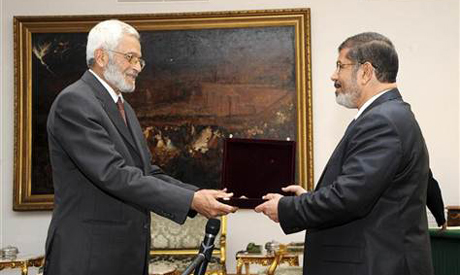 Egypt's Supreme Administrative Court (SAC) is expected to rule on Monday on the petition made by the Muslim Brotherhood lawyers to recuse the judges that will rule on the constitutionality of the country's second Constituent Assembly, which is tasked with drafting Egypt's new constitution.
Egypt's Supreme Administrative Court (SAC) is expected to rule on Monday on the petition made by the Muslim Brotherhood lawyers to recuse the judges that will rule on the constitutionality of the country's second Constituent Assembly, which is tasked with drafting Egypt's new constitution.
The SAC had already ruled that the law which regulated the elections of lower house of parliament (the People's Assembly) is unconstitutional, and the military council dissolved it in mid-June.
Since the lower house had chosen the Constituent Assembly's 100 members, the constitutionality of the second Assembly itself came into question.
The Muslim Brotherhood, as the majority in the now-dissolved lower house of parliament, took up the task of defending the legitimacy of the Constituent Assembly. They filed a petition to replace the SAC judges who would rule on the constitutionality of the second Constituent Assembly, arguing the panel is biased given that they had previously ruled against the constitutionality of the first Constituent Assembly back in the spring.
Egypt's first post-Mubarak Constituent Assembly was dissolved following a court ruling in April 2012 which had found it unconstitutional because members of parliament were included in the assembly.
In accordance with the March 2011 Constitutional Declaration, parliament members were not allowed to elect themselves for the Constituent Assembly.
The second Constituent Assembly still faces many of the same problems as the first one.
For instance, the current Constituent Assembly, again, has MP's among its members.
The new constitution drafting body is also at risk of being dissolved considering that the lower house which had selected its members had also been ruled unconstitutional.
And lastly, the second Constituent Assembly is also accused of being Islamist dominated.
In a repeat of what happened with the first Constituent Assembly, liberal and leftist forces walked out of the second Assembly's sessions early in June after, again, complaining of unbalanced representation.
The liberal Egyptian Bloc parties – which include the Free Egyptians, the Egyptian Social Democratic Party and the leftist Tagammu Party – together with the Nasserist Karama, the Socialist Popular Alliance Party and the Democratic Front Party, all withdrew from the Assembly on 11 June 2012.
They were replaced by the Islamist-chosen substitutes, further tilting the balance to the benefit of the Islamist camp.
Assembly work under fire
Meanwhile, several of the articles proposed for Egypt's new constitution that were made public in recent days have faced criticism from various quarters.
On Saturday, for example, the National Front for Protecting the Revolution, a group of non-Islamist activists who had decided last June to support the Muslim Brotherhood presidential candidate Mohamed Morsi against Mubarak-era Ahmed Shafiq, in part, because his campaign had promised the Constituent Assembly would be more inclusive, said it regrets that Morsi had not made good on his promise.
The Maspero Youth Union, a revolutionary Coptic youth group, declared they will demonstrate on Monday to press for the dissolution of the Constituent Assembly. The group's objection to the parliament-chosen body is mainly based on its Islamist makeup and was intensified
Some secular political forces in Egypt fear the articles will limit the freedom to build places of worship, and exclude the practice of religions not within the Abrahamic religions (Judaism, Christianity and Islam).
On the question of freedom of belief and thought, the term "within the law," as written in the articles, is seen by some as vague and, therefore, subject to manipulation.
"How can the constitution claim it protects the freedom of religion if it limits it to 'within the law'?" retorts labour lawyer and ex-presidential candidate, Khaled Ali.
Ali also says the articles proposed, although not finalised, also threaten the right to strike.
The right to strike "in accordance to the law" leaves it up to the legislative body to decide when it would be legitimate for a strike to take place.
The right to freely form syndicates is also controlled by the same term "in accordance to the law" while political parties and NGOs can be formed only by prior notification.
Future of final draft, and Assembly, not clear
Responding to critics, the Constituent Assembly spokesman, Wahid Abdel-Magid, said on Sunday that all articles made public so far are merely proposals and have not yet been approved.
According to Abdel-Maguid, the final constitutional draft will not be voted on and approved in the Assembly before mid-August, and any draft constitution must be ratified by a national referendum according to the constitutional declaration which was issued by the Supreme Council of the Armed Forces (SCAF) in March 2011.
If the Constituent Assembly is found unconstitutional and dissolved, however, the Constituent Assembly will be recomposed by the SCAF in accordance to the addendum to the constitutional declaration that the military slipped in on 17 June just days before the Muslim Brotherhood candidate, Mohamed Morsi, won the presidency.
The addendum also dictates that the president, the head of SCAF, the prime minister, the Supreme Council of the Judiciary or a fifth of the Constituent Assembly have the right to veto any article proposed by the constitution drafting body.



